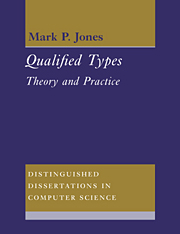Book contents
10 - Epilogue
Published online by Cambridge University Press: 05 May 2010
Summary
One of the main goals in preparing this book for publication was to preserve the thesis, as much as possible, in the form that it was originally submitted. With this in mind, we have restricted ourselves to making only very minor changes to the body of the thesis, for example, correcting typographical errors.
On the other hand, we have continued to work with the ideas presented here, to find new applications and to investigate some of the areas identified as topics for further research. In this short chapter, we domment briefly on some examples of this, illustrating both the progress that has been made and some of the new opportunities for further work that have been exposed.
We should emphasize once again that this is the only chapter that was not included as part of the original thesis.
Constructor classes
The initial ideas for a system of constructor classes as sketched in Section 9.2 have been developed in (Jones, 1993b), and full support for these ideas is now included in the standard Gofer distribution (versions 2.28 and later). The two main technical extensions in the system of constructor classes to the work described here are:
The use of kind inference to determine suitable kinds for all the user-defined type constructors appearing in a given program.
The extension of the unification algorithm to ensure that it calculates only kind-preserving substitutions. This is necessary to ensure soundness and is dealt with by ensuring that constructor variables are only ever bound to constructors of the corresponding kind. Fortunately, this has a very simple and efficient implementation.
- Type
- Chapter
- Information
- Qualified TypesTheory and Practice, pp. 121 - 125Publisher: Cambridge University PressPrint publication year: 1994



